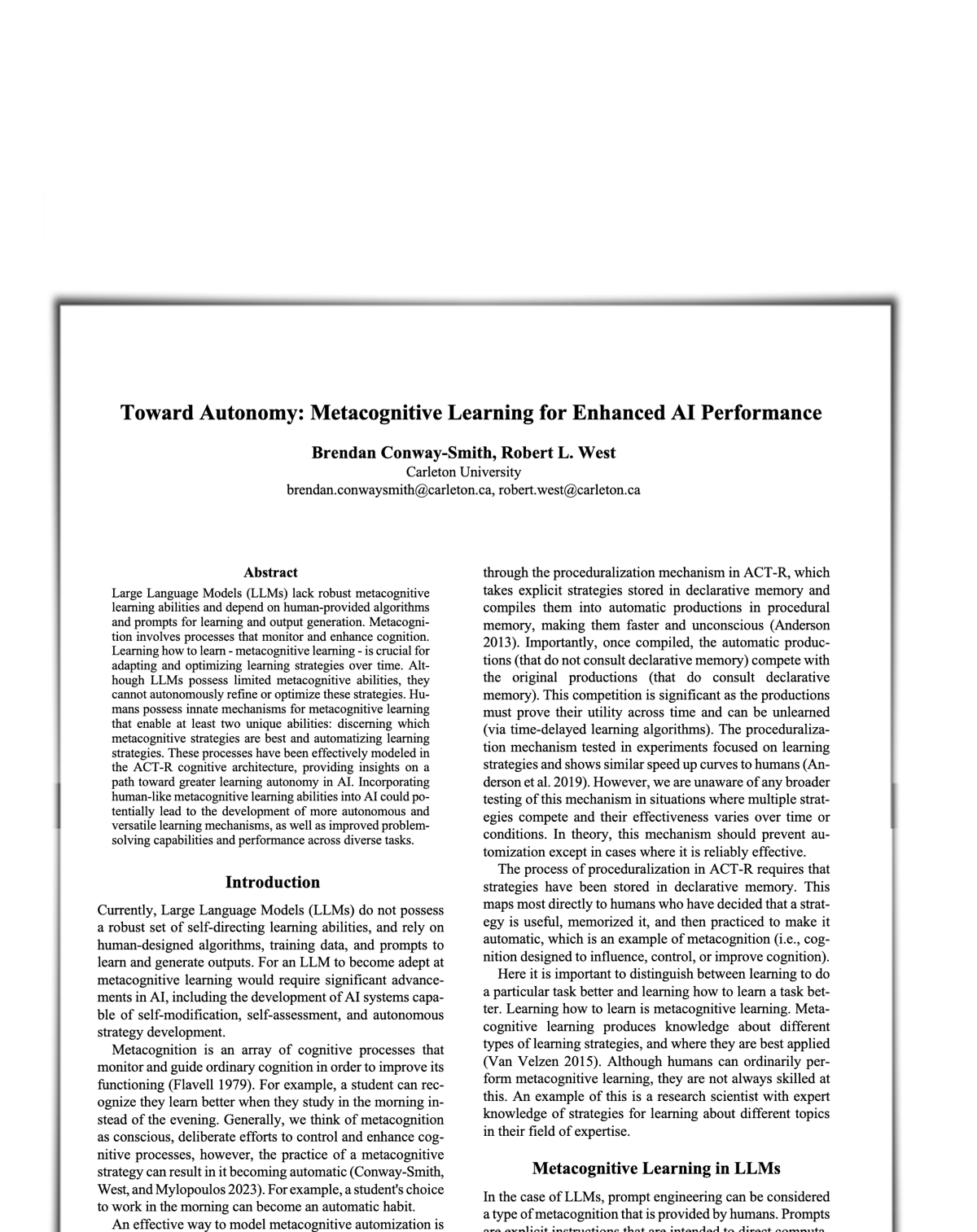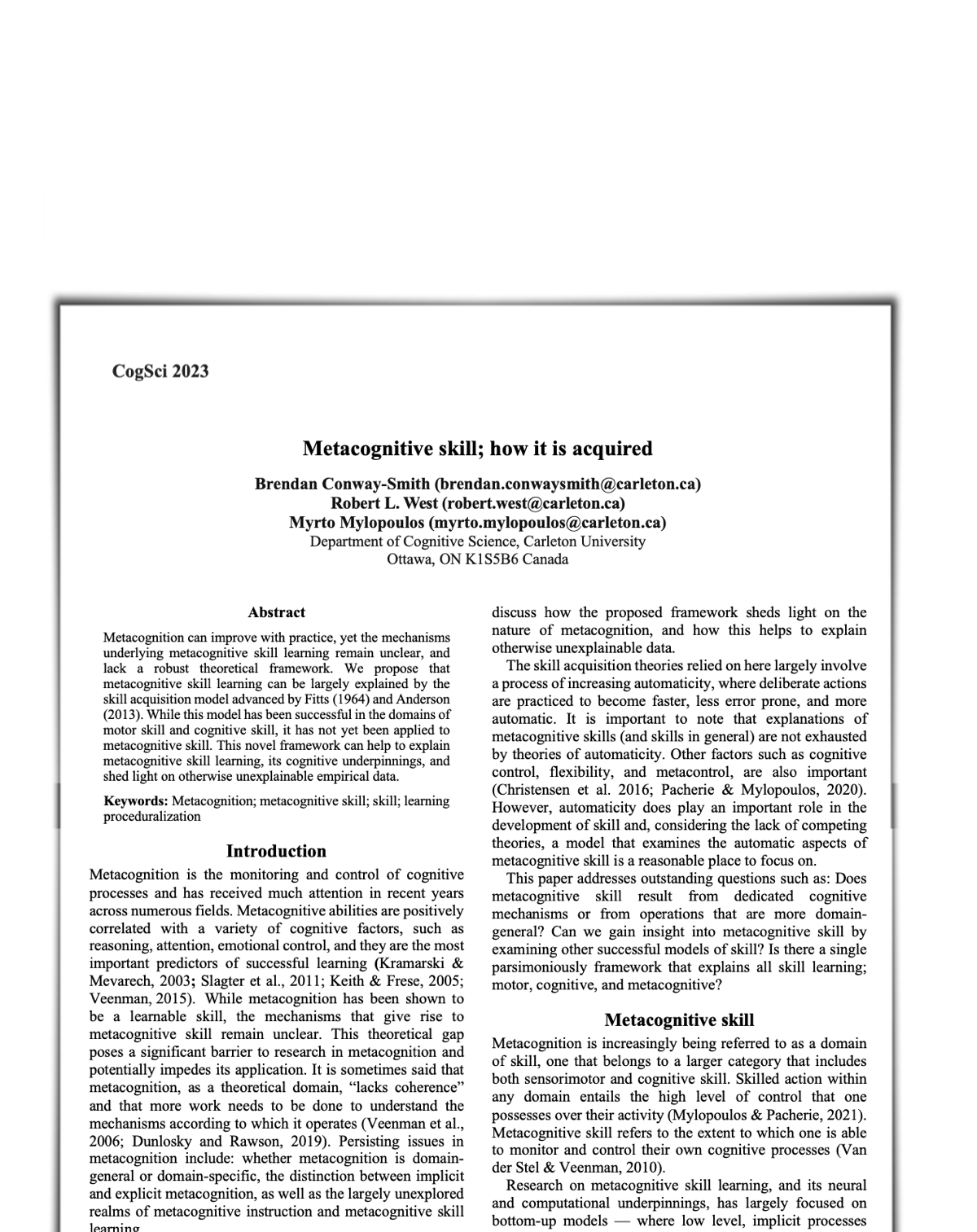PUBLICATIONS
Conway-Smith, B. (2025 in press). Metacognition as a domain of skill. In Proceedings of the Annual Conference of the Cognitive Science Society. PDF
Conway-Smith, B., & West, R. L. (2025 in press). Metacognition in HCI: Designing Systems for Planning and Flexibility. In Proceedings of the 27th HCI International Conference, HCII 2025.
Conway-Smith, B., & West, R. L. (2024). The Computational Mechanisms of Detached Mindfulness. In Proceedings of ICCM 2024, 22nd International Conference on Cognitive Modelling. PDF
Conway-Smith, B., & West, R. L. (2024). Toward Autonomy: Metacognitive Learning for Enhanced AI Performance. In AAAI Spring Symposium on Human-Like Learning in AI. PDF
West, R., Eckler, S., Conway-Smith, B., Turcas, N., Tomkins-Flanagan, E., Kelly, M. (2023). Bridging generative networks with the common model of cognition. In AAAI Fall Symposium. PDF
Conway-Smith, B., & West, R. L. (2023). Metacognitive threshold: a computational account. In Proceedings of ICCM 2023 - the 21st International Conference on Cognitive Modelling. PDF
Conway-Smith, B., West, R. L. & Mylopoulos, M. (2023). Metacognitive skill: how it is acquired. In Proceedings of the Annual Conference of the Cognitive Science Society. PDF
Conway-Smith, B., & West, R. L. (2022). System-1 and System-2 realized within the common model of cognition. In AAAI Fall Symposium: Thinking Fast & Slow and Other Cognitive Theories in AI. PDF
Conway-Smith, B., & West, R. L. (2022). Clarifying System 1 & 2 through the common model of cognition. In Proceedings of ICCM 2022 - the 20th International Conference on Cognitive Modelling. PDF
West, R. L., & Conway-Smith, B. (2019). A computational theory of feeling. In Proceedings of ICCM 2019 - the 17th International Conference on Cognitive Modelling, 295-300. PDF

Metacognitive Learning for Enhanced AI Performance (Stanford, AAAI 2024).
The paper proposes adding meta-learning into AI systems, to achieve more autonomous learning and problem-solving abilities.

Metacognitive threshold: a computational account
This paper explore ways of accounting for the metacognitive threshold, and discusses mechanisms by which it can be influenced through training.

Metacognitive skill: how it is acquired
This paper presents the first and so far the only framework for understanding the cognitive mechanisms underlying metacognitive skill learning.

System-1 and System-2 realized within the Common Model of Cognition
AAAI 2022: This paper aims to clarify how System-1 and System-2 can be used to build Artificial Intelligence, as well as its implications for metacognition. Watch Brendan’s presentation here.

Clarifying system 1 & 2 through the common model of cognition
ICCM 2022: By grounding System-1 and System-2 in the Common Model we aim to clarify their underlying mechanisms, persisting misconceptions, and implications for metacognition.

How metacognition - thinking about thinking - can improve the mental health crisis
Online article: Metacognition is the study of how the mind can be aware of, and control, its own activity. Understanding how the mind works helps us to use it better.

A computational theory of feeling
ICCM 2019: Accurately describing human cognition requires integrating feelings into cognitive modeling, as feelings are integral to guiding cognitive processes. In this paper we propose a unified computational definition of feelings that can be used to add feelings to cognitive models.

Clarifying metacognition through computational modelling
MA thesis: The intention of this thesis is to help clarify the nature of metacognition, its underlying mechanisms, and its implications for advancing a unified theory of metacognition.
